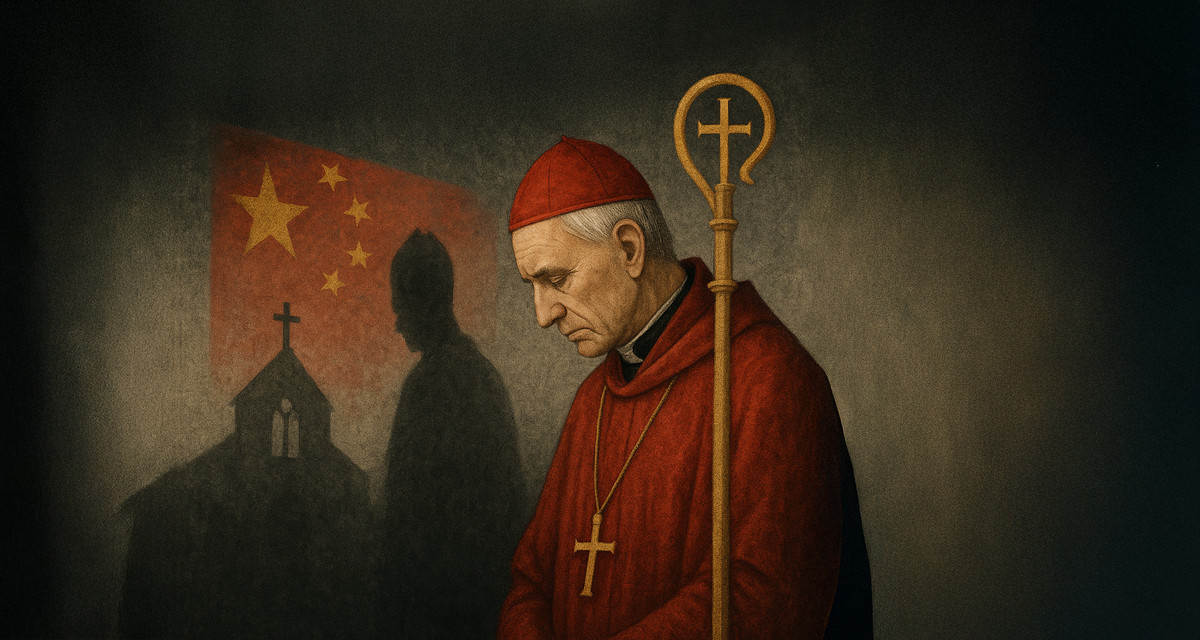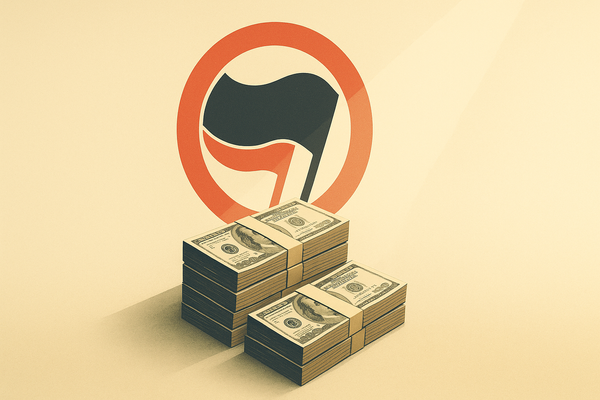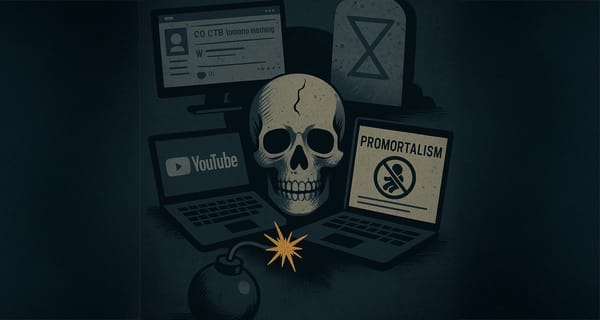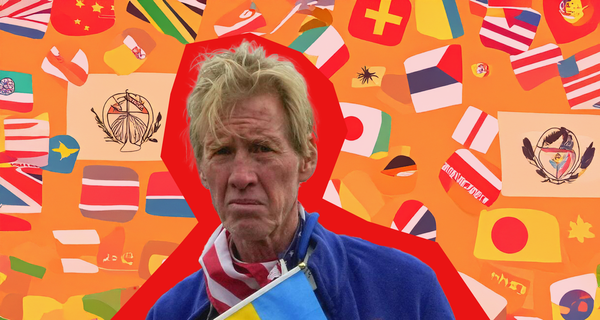The Silent Church: China’s Disappeared Bishops and the CCP's War on Faith

Bishop James Su Zhimin was a prominent figure in China’s underground Catholic Church. As the Bishop of Baoding in Hebei Province, he remained loyal to the Vatican and resisted the Chinese government's attempts to control religious practice, efforts now enforced through the state-run Chinese Catholic Patriotic Association (CCPA).
Bishop Su was first detained in 1956 and endured repeated imprisonments and forced labor over the decades. After his final arrest in 1997, he vanished from public view. In 2003, he was briefly spotted by family members in a Baoding hospital, still under police custody. He has not been seen or heard from in over 17 years. His fate remains unknown. His grave is likely unmarked. His Church remains underground, hunted by the Chinese Communist Party, yet it endures, sustained by the quiet devotion of its most faithful adherents.
Bishop Su’s disappearance is not an isolated tragedy. Across China, Catholic bishops and priests who refuse to sever ties with Rome have met similar fates, silenced, imprisoned, or vanished into the opaque machinery of the Chinese state. At least nine bishops are currently held in indefinite detention or have been forcibly disappeared, their flocks reassigned to state-appointed clergy and absorbed into the bureaucratic coldness of the Patriotic Church.
Among the clergy China deems noncompliant is an entire body of Catholic leadership systematically targeted across the country. Bishop Joseph Zhang Weizhu of Xinxiang was arrested while recovering from cancer surgery. Bishop Peter Shao Zhumin of Wenzhou has been repeatedly detained for refusing state oversight. Cardinal Joseph Zen of Hong Kong, an elderly man, was arrested under the National Security Law for his role in a humanitarian fund. Others including Bishops Fan Zhongliang, Thaddeus Ma Daqin, Cosmas Shi Enxiang, Joseph Sun Jigen, Julius Jia Zhiguo, Stephen Yang Xiangtai, Augustine Cui Tai, Vincent Guo Xijin, Melchior Shi Hongzhen, Joseph Xing Wenzhi, John Baptist Wang Jin, Thomas Zeng Jingmu, and Andrew Han Jingtao have faced the same fate. Detained, erased, or isolated, they are replaced by Party-approved priests loyal to the state, not the successor of Peter.
The Chinese Catholic Patriotic Association (CCPA), a bureaucratic tool of the Chinese Communist Party created in 1957 to eliminate Vatican influence, is overseen by the United Front Work Department. It works to register clergy loyal to state ideology, enforces sinicization by adapting Catholicism to socialist principles, and promotes bishops approved by the CCP rather than the Pope. While the CCPA reports non-compliant clergy and attempts to integrate them into the state system, it is the CCP’s police and judicial apparatus that carries out punishments, detentions, and disappearances.
The CCP’s crackdown has not stopped with bishops. In May 2021, seven priests and ten seminarians were arrested in Xinxiang during a broader crackdown. In April 2024, Father Chi Huitian and Professor Chen Hekun disappeared in Baoding without explanation.
These are not isolated events, but symptoms of a system working to erase a Church that extends beyond the reach of the party. This is not a policy of restraint, but one of eradication. These men are not dissidents in the political sense. They are successors to the apostles, punished for their fidelity to a Church that transcends national borders and temporal regimes. Their disappearances echo the ancient persecution of Christians, not by emperors in coliseums, but by modern tyrants in party offices.
Appendix A: Chinese Catholic Clergy Arrested, Detained, or Disappeared (1997-2024)
| Name | Diocese/Location | Details | Source |
|---|---|---|---|
| Bishop Peter Shao Zhumin | Wenzhou, Zhejiang | Arrested multiple times for refusing to join the CCPA. Last seen in 2011; current whereabouts unknown. | The Pillar, 2024 |
| Bishop Joseph Zhang Weizhu | Xinxiang, Henan | Arrested in May 2021 while recovering from cancer. Remains in custody without trial. | Catholic News Agency, 2024 |
| Bishop James Su Zhimin | Baoding, Hebei | Arrested in 1997 for refusing to join the CCPA. Spent 28 years in prison/labor camps. Last seen 17 years ago; feared dead. | USCIRF |
| Cardinal Joseph Zen Ze-kiun | Hong Kong | Arrested in May 2022 under National Security Law for involvement with a humanitarian relief fund. Vocal critic of CCP religious policy. | Hudson Institute, 2024 |
| Bishop Joseph Fan Zhongliang | Shanghai | Arrested in 1955; spent decades in prison or under house arrest. Died in 2014. | Cardinal Kung Foundation, 2014 |
| Bishop Thaddeus Ma Daqin | Shanghai | Resigned from the CCPA in 2012 during ordination. Placed under house arrest; barred from ministry. | Catholic Culture, 2023 |
| Bishop Cosmas Shi Enxiang | Yixian, Hebei | Arrested in 2001. Reports in 2015 indicated death in custody; no confirmation or return of body. | Catholic Culture, 2015 |
| Bishop Joseph Sun Jigen | Handan, Hebei | Multiple detentions. Arrested in 2011 shortly after ordination. | UCA News, 2011 |
| Bishop Julius Jia Zhiguo | Zhengding, Hebei | Arrested numerous times for refusing to align with the CCPA. | Asia News, 2005 |
| Bishop Stephen Yang Xiangtai | Handan, Hebei | Placed under surveillance due to loyalty to the Vatican. | Agenzia Fides, 2021 |
| Bishop Augustine Cui Tai | Xuanhua, Hebei | Under house arrest or detention since 2007, with brief periods of release. | Asia News, 2023 |
| Bishop Melchior Shi Hongzhen | Tianjin | Under house arrest for over 15 years. Confined to parish compound; recognized by Vatican in 2024, but remains restricted due to age and CCP control. | Vatican News, 2024 |
| Bishop Joseph Xing Wenzhi | Shanghai | Disappeared in 2011 under unexplained circumstances. The CCP claimed he resigned, but no confirmation or public presence since. | UCANews, 2012 |
| Bishop Vincent Guo Xijin | Mindong, Fujian | Detained multiple times over 30 years. In 2018, pressured to step down under Vatican-CCP deal; faced surveillance, eviction, and utility shutoffs. Resigned in 2020. | Aleteia, 2025 |
| Bishop John Baptist Wang Jin | Yuci, Shanxi | Imprisoned for 20 years during the Cultural Revolution (1965–1985). Appointed bishop with Vatican approval in 1999. Recognized by both Rome and Beijing. Died in 2014. | Catholic Culture, 2014 |
| Bishop Thomas Zeng Jingmu | Yujiang, Jiangxi | Ordained a priest in 1949, he was clandestinely consecrated as bishop in 1990. He spent 23 years in prison for refusing to join the CCPA. | Asia News, 2016 |
| Bishop Andrew Han Jingtao | Siping, Jilin | Imprisoned for 27 years (1953–1980) for refusing to join the CCPA. Secretly appointed bishop in 1982; consecrated in 1986. Lived under surveillance from 1997 until his death at 99. | Catholic News Agency, 2020 |
| Seven Priests and Ten Seminarians | Xinxiang, Henan | Arrested in May 2021 in crackdown on underground Church activity. | Catholic Philly, 2021 |
| Fr. Chi Huitian & Prof. Chen Hekun | Baoding, Hebei | Disappeared in April 2024; whereabouts unknown. | Asia News, 2024 |
For decades, the Catholic Church in China has existed behind a veil, split between the state-approved CCPA and the underground Church loyal to Rome. Under Xi Jinping, however, Beijing’s tolerance for even this precarious balance has vanished. The Vatican’s 2018 agreement with the CCP on bishop appointments, hailed at the time as a diplomatic breakthrough, now lies in shambles. What was meant to unite the Church in China has only emboldened the regime to undermine the agreement’s intent and ignore its obligations.
The CCP's tools are blunt and chilling: house arrests, forced reeducation, rewriting of sacred texts, and an Orwellian system of surveillance that bans children from attending Mass while surveillance cameras peer from sanctuary walls. In one especially macabre twist, state-sanctioned texts now depict Christ stoning an adulteress to death, a revision more Mao than Messiah.
The Chinese Communist Party’s campaign against the Catholic Church is not merely about politics. It is about metaphysics. The totalitarian state, by its nature, cannot tolerate a truth that transcends it. It cannot abide a Lord who reigns above the Party. And so, it must replace the Cross with the portrait of Xi Jinping. It must rewrite Scripture to make Christ obedient to Marxist-Leninism. It must arrest bishops, raid seminaries, and surveil the sacraments.
And yet, the West whispers. Politicians, bishops, and prominent NGOs have yet to cut through the noise of louder priorities and diplomatic euphemisms. Fear of economic reprisal from China, of losing access to trade deals and diplomatic niceties, keeps their tongues in check. The Vatican, bound to its Faustian pact, remains diplomatically cordial even as its flock is persecuted into silence.
The irony is thick: nations that once prided themselves on shielding religious liberty now shirk responsibility when it is most needed. The moral backbone of Western civilization, forged in the fires of religious conscience, bends with the promise of Chinese markets. But not all hope is lost.
Opportunities for Western Response
A handful of strategic and humane responses remain on the table, if only the political will can be summoned. The United States and its allies could impose Magnitsky-style sanctions on the architects of repression, targeting specific Chinese officials involved in religious suppression, arbitrary detentions and extrajudicial killings. The Treasury’s OFAC already has the blueprint, thanks to prior sanctions over Uyghur abuses in Xinjiang. These sanctions could be applied to officials in the United Work Front, which oversees religious affairs, leaders of the National Religious Affairs Administration, and party officials who authorized the detention of the underground bishops or the rewriting of religious texts.
Vatican and Ecclesiastical Strategy
In parallel, a Vatican reevaluation of its 2018 provisional agreement between the Holy See and CCP is overdue. Future cooperation with Beijing must hinge on transparency and autonomy, not blind compromise. Bishops in Shanghai and Xinxiang were recently appointed by the regime without Vatican approval, in violation of the very agreement that was meant to prevent such unilateralism. If the agreement was meant to secure communion, it has instead enabled capitulation. A special papal envoy for Chinese Catholics, akin to Cold War-era emissaries, could provide not only spiritual oversight but moral visibility.
There is precedent here. Throughout the 20th century, faithful Catholic witness often came not from Vatican diplomacy but from men and women who bled. The Church of Silence, behind the Iron Curtain, was not silent in its faith, it was silenced by force. But in time, truth overcame ideology, martyrs inspired the appointments of bishops, and underground catechists nurtured the formation of saints. In past conflict, Rome learned that compromise with Caesar must never come at the expense of Christ. We face that same lesson in confronting the Chinese Communist Party’s repression of Chinese Catholics.
Three Roads to Rescue
Refugee pathways, too, must open. In the face of China’s systematic persecution of the Catholic Church, Western democracies must offer more than sympathy and statements. They must offer a way out. History, after all, will not judge us by the eloquence of our condemnations, but by the lifelines we extend.
The West has the means and the precedent, from Operation Allies Welcome to the Welcome Corps, to offer humanitarian parole for China’s persecuted clergy. These priests are not security risks. They are shepherds in exile. Catholic parishes in America, Canada, and Europe could sponsor and shelter these exiles just as they did Cuban and Vietnamese refugees fleeing Communism.
First, the United States should establish a China-specific humanitarian parole program for Catholic clergy, seminarians, and their families under threat. Modeled on the resettlement efforts for Afghan and Ukrainian evacuees, the program would fast-track those with clear evidence of persecution: arrest, surveillance, and forced registration with the state-run church. It would be administered not by new bureaucracies, but by existing ones: USCIS, the State Department, and DHS. The infrastructure is already there.
Second, Washington and its allies must partner with NGOs to fund escape networks for underground clergy. This is not novel, the West once helped smuggle priests out of Soviet bloc countries under similar conditions, and the same can be done now. Organizations like ChinaAid, the Jesuit Refugee Service, and Voice of the Martyrs already operate near the front lines: documenting abuse, providing safe transit, and offering medical and spiritual triage. Support for these groups could flow through existing channels such as USAID, the Bureau of Democracy, Human Rights, and Labor.
Third, the West must awaken its own spiritual backbone. Catholic dioceses in the United States, Canada, and Europe should be allowed and encouraged to sponsor Chinese clergy through a faith-based refugee track. The Canadian model, where churches directly sponsor refugees, has long proven that civil society can succeed where state systems lag. Programs like the U.S. Welcome Corps already provide that framework.
These proposals are not radical; they are rooted in precedent, guided by prudence. This is not simply a Chinese story. It is a Catholic one, a Christian one, and ultimately a civilizational one. The CCP’s campaign against the Church is more than a crackdown on religious worship, it is an assertion that no authority, not even spiritual, may rival the supremacy of the Party. The destruction of the Catholic Church in China would not just mark the death of faith behind the Great Firewall. It would signal the impotence of the free world to defend its own ideals.
To leave the faithful to face the cold machinery of the surveillance state alone is not neutrality, it is complicity in the slow martyrdom of a Church. If the West fails to speak, to sanction, to shelter, it is not the underground Church in China that loses its voice. It is the free world that goes mute.
A detailed report accompanies this piece. If you are a journalist, researcher, or reader, please reach out for a copy of the report that further outlines strategic pathways.




